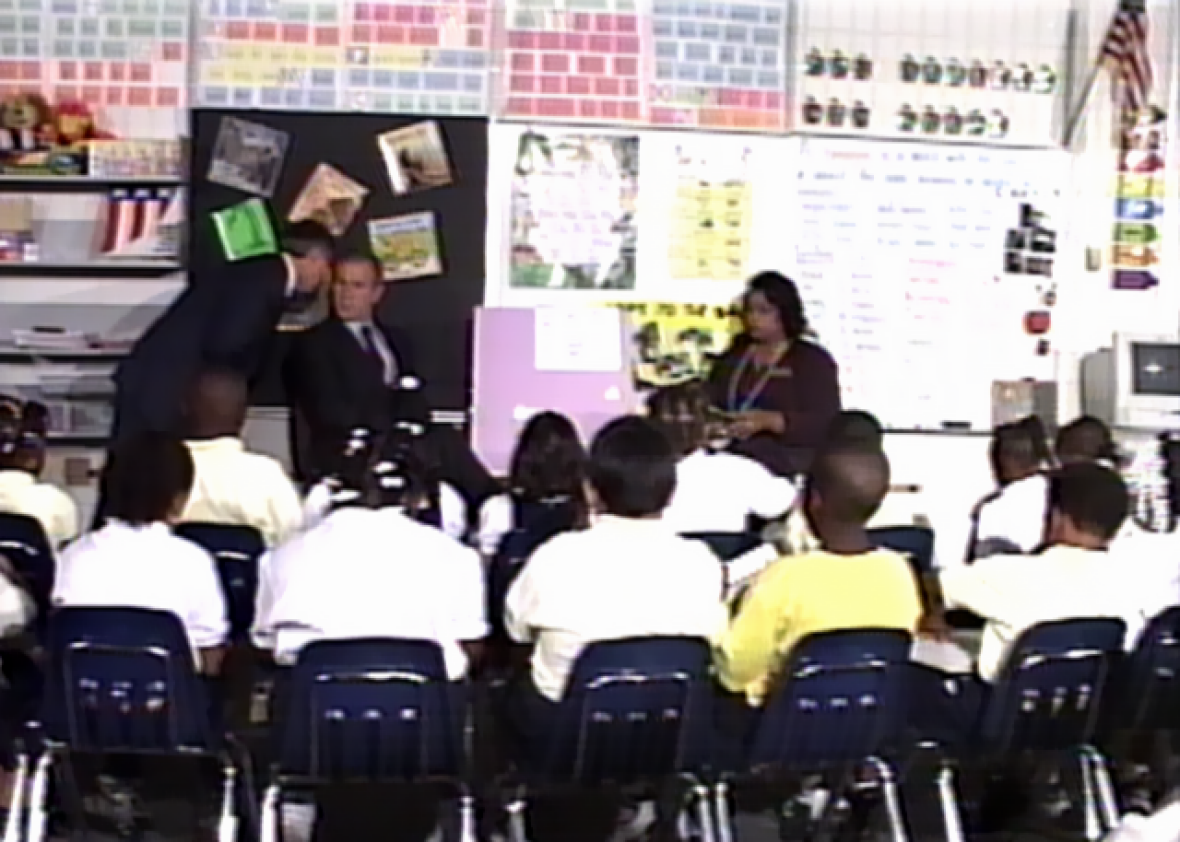The threat warnings that George W. Bush’s White House received—and reportedly brushed off—prior to the 9/11 terrorist attacks were more dire than previously known, Politico reported on Thursday. In a blockbuster account by Chris Whipple, based on interviews he did for a Showtime documentary, former chief of the CIA’s counterterrorism center Cofer Black and former CIA director George Tenet described how they spent the months leading up to 9/11 trying to warn the White House that a spectacular attack was imminent and that the country needed to take urgent action, but to no avail.
Here’s how Politico describes part of the account:
The drama of failed warnings began when Tenet and Black pitched a plan, in the spring of 2001, called “the Blue Sky paper” to Bush’s new national security team. It called for a covert CIA and military campaign to end the Al Qaeda threat—“getting into the Afghan sanctuary, launching a paramilitary operation, creating a bridge with Uzbekistan.” “And the word back,” says Tenet, “‘was ‘we’re not quite ready to consider this. We don’t want the clock to start ticking.’” (Translation: they did not want a paper trail to show that they’d been warned.)
“It was very evident that we were going to be struck, we were gonna be struck hard and lots of Americans were going to die,” Black told Politico of the CIA’s threat assessment in May of 2001. Tenet was more specific about the nature of some of the warnings. “There were real plots being manifested,” he said. “The world felt like it was on the edge of eruption. In this time period of June and July, the threat continues to rise. Terrorists were disappearing [as if in hiding, in preparation for an attack]. Camps were closing. Threat reportings on the rise.”
On July 10, 2001, the situation became more urgent than ever, with Black saying the agency’s al-Qaida unit had compiled multiple sources of “absolutely compelling” information that he described as “the last straw.” Tenet says he took the rare step of insisting upon an immediate meeting with National Security Adviser Condoleezza Rice. While this meeting—which was prompted by new reporting from the head of the agency’s al-Qaida unit Richard Blee—has been reported on before, it has never been described in such stark terms.
From Politico:
Tenet vividly recalls the White House meeting with Rice and her team. (George W. Bush was on a trip to Boston.) “Rich [Blee] started by saying, ‘There will be significant terrorist attacks against the United States in the coming weeks or months. The attacks will be spectacular. They may be multiple. Al Qaeda’s intention is the destruction of the United States.’” [Condi said:] ‘What do you think we need to do?’ Black responded by slamming his fist on the table, and saying, ‘We need to go on a wartime footing now!’ ”
When Whipple asked Black what happened about that warning, he responded in bemusement. “Yeah. What did happen?” he said. “To me it remains incomprehensible still. I mean, how is it that you could warn senior people so many times and nothing actually happened? It’s kind of like The Twilight Zone.”
Politico reports that Rice stands by the account of the meeting in her memoir, which was that her “recollection of the meeting is not very crisp because we were discussing the threat every day.” She wrote that she thought the White House had taken sufficient action by raising the threat level for U.S. personnel overseas.
That the White House received unspecific warnings of an imminent attack before 9/11 has long been known. Just one month before the attacks, on Aug. 6, 2001, Bush famously received a top secret brief titled “Bin Laden Determined to Strike in U.S.” that described how Osama bin Laden had long sought to hijack planes and that New York was a possible target for an attack. In her testimony before the 9/11 Commission, Rice brushed it off as “historical information based on old reporting” that “did not, in fact, warn of any coming attacks inside the United States.” Peter Beinart recently documented the other warnings that an attack was imminent and the White House’s less than active response to them after the issue was raised on the GOP campaign trail when Donald Trump criticized Jeb Bush’s assertion that his brother “kept us safe.”
The entire Politico report is worth reading, but here are some of the other revelations:
- George W. Bush personally rejected two techniques in the CIA’s proposed enhanced interrogation program. (One of them was believed to have been “mock executions.” The accepted proposals, including waterboarding, have been roundly criticized as torture.)
- Former Obama CIA Director Leon Panetta described a previously censored account of killing an al-Qaida member who masterminded the 2009 Afghanistan bombing that killed seven CIA operatives.
- John Brennan talks in cryptic terms about a reported joint CIA-Mossad mission that killed Hezbollah leader Imad Mughniyah.
- Ex-Director Robert Gates disagrees with the practice of targeting Americans who have become enemy combatants for assassination, like the Obama administration did in killing militant Anwar al-Awlaki in an attack that also killed his 16-year-old American son Abdulrahman Anwar al-Awlaki, among others. (He wants judicial review of such attacks).
- Several former CIA directors oppose the enhanced interrogation program, while Tenet continues to insist that it disrupted many terrorist plots, directly contradicting a Senate intelligence report.
